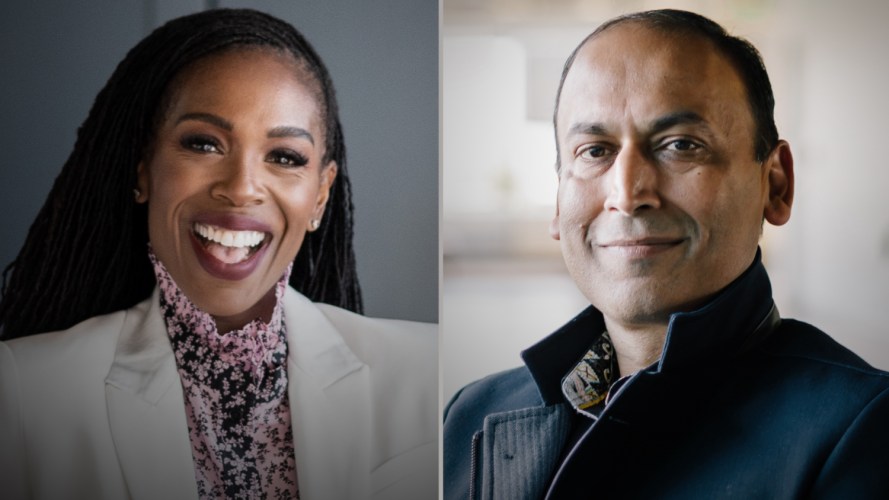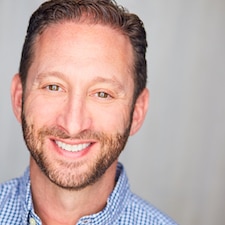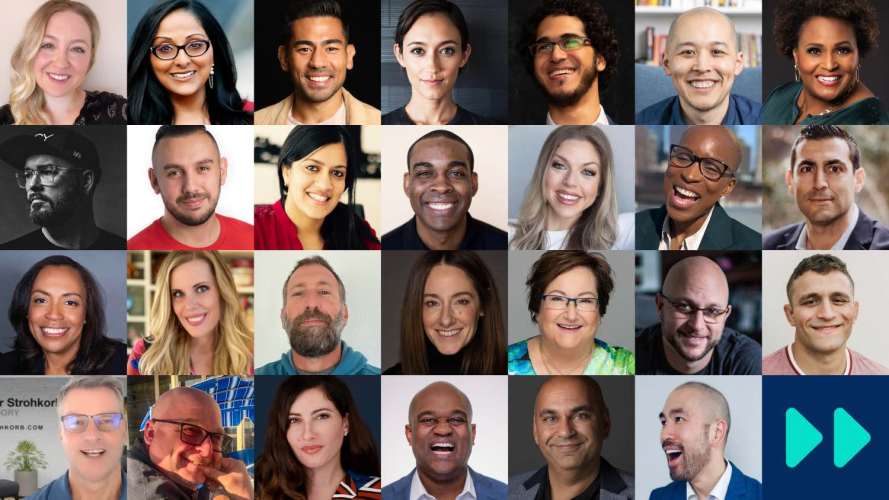Find the Right Leadership Style for You — Poshmark’s CEO Explains How



Whether you’re starting your career or looking to take things to the next level, knowing how best to lead can help you get ahead. Poshmark CEO Manish Chandra shares his advice.

Ari Bendersky
People develop their leadership style throughout their careers and it can grow, morph, and change over time. When you’re first starting out, you may be focused more on finding your place in the corporate world than thinking about your leadership style. But as you continue to advance, developing a unique leadership style can propel you.
From mid-level managers to the C-suite, leaders have different styles. Some may use an autocratic or authoritarian approach, ruling over the company through fear and intimidation. Others may be laissez-faire and hands off. Then there are those like Poshmark co-founder and CEO Manish Chandra, who leads with a more supportive, democratic, and motivational style. Chandra discussed this and ways to develop one’s own leadership style on a recent episode of ”Boss Talks” on Salesforce+.
Here, Chandra offers tips on how to lead with integrity and courage, how to advise people at different levels in their career, and how mentors can impact leadership style.
Table of contents
Scroll down to watch the episode of #BossTalks and read the transcript.
Learn to lead with empathy
Develop your leadership style to bring empathy into your organization. Discover how on Trailhead, the free online learning platform from Salesforce.



Lead with integrity and find your unique superpower
Growing up in India, Chandra spent time over the summers working alongside his grandfather at his pharmaceutical shop in a busy marketplace in Delhi. There, he watched intently as people around him interacted, negotiated, and made deals. All the while, he quickly noticed how his grandfather always treated everyone with respect, no matter who they were. This has carried into his own leadership style.
“My grandfather was a man of intense integrity who treated everyone with respect and care,” Chandra said. “Those are values that have been part of what I learned and what I grew up with, and hopefully I embrace in my journey today.”
That care for others translates into his work today. He encourages everyone to find that one thing within themselves that is uniquely theirs, their own superpower. Tapping into that will help guide your leadership style, how you work, and who you work with.
“If you can partner with the right leadership, with the right external circumstances, and have that passion for growth, you can become anything,” he said. “I really mean it in a very direct way. Your journey itself is so interesting in terms of how we can reinvent ourselves and truly find that strength.”
Embrace situational leadership
In addition to leading with empathy and humility, Chandra said, you need to understand how to embrace situational leadership. As a leader, you will work with and encounter people at different stages of their career journey. Because of this, knowing how to talk to someone is an important leadership style to develop. He said being able to see where someone is — not only in their career evolution, but also in a specific role — is an incredibly powerful skill.
“If I’m talking to someone, my guidance can be very directive or can be very inspirational, very goal oriented,” Chandra said. “But if I mismanage it, they’ll be dissatisfied, confused, and may not achieve what I want them to achieve. The mark of a true leader is to be very situation specific, empathetic, and then ultimately very authentic and true and humble.”
Mentors can impact your leadership style
While the goal is to develop your own unique leadership style, learning from others can have a tremendous impact. Chandra said mentors, when you’re younger, can be people you know like family members or teachers. As you evolve, finding mentors who help groom you are very important.
“That partnership can actually help identify superpowers inside of you,” Chandra said. “[That can] help bring out a leadership style you might think is a weakness, and it could be one of your biggest strengths.”
Lead with courage and diversity of styles
Being a good leader, Chandra said, means getting comfortable with being uncomfortable and recognizing when your leadership style needs to change. Without having that self awareness, you can continue down a path that ultimately can hinder your business. He said you need to lead with courage and have the ability to push through limitations.
“Courage goes to the belief that you are capable of anything and the only limitation is in your mind,” Chandra said. “Your ambition, your vision, and your delivery of anything about you, about an idea is limited by your imagination.”
Learning to develop different sides of yourself will help you lead with a diversity of styles.
“Some people are very empathetic, some people are very aggressive — you need all that,” Chandra said. “If your culture becomes very monochromatic, it’s very hard to evolve your business and grow.”
Want to be a Boss?
Catch up on every episode of #BossTalks.



Watch the episode:
And read the full transcript from the show:
Ebony Beckwith:
Hello everyone and welcome to BossTalks, a series featuring candid, career conversations with some of the best in business. Today’s episode is dedicated to finding your leadership style. Now, I get a ton of questions on this topic from our BossTalks community. So this episode is brought to you by popular demand. Now, I can tell you that my leadership style did not happen overnight. It has taken years and years of practice and trying new things for me to grow into a style that really felt authentic to me. Because being a leader is not about adopting someone else’s style or doing things exactly the way they did it. It’s all about embracing your superpowers and leading from a place of truth and authenticity. So today I’ve invited a leader that I’ve learned so much from, and that’s Poshmark CEO, Manish Chandra. Manish, welcome to BossTalks.
Manish Chandra:
Hi, Ebony. Great to see you and thank you for having me.
Ebony Beckwith:
When I thought about who I wanted on the show for this episode, I thought about you and your career journey, because it’s so inspiring. I love how you talk about growing up with that entrepreneur spirit and how that experience really charted your path. So tell us more about that.
Manish Chandra:
Sure. Yeah. I grew up in India and my summers were spent in my grandfather’s pharmaceutical shop in one of the busiest markets in Delhi. And what I saw growing up was people transacting, interacting, talking to each other, deal-making. And, I was all of like nine and 10 years old. So it left a very deep impression on how shopping commerce business should be done. And above all, my grandfather was a man of intense integrity. So that was the other aspect that I learned through that journey. And, he was a man who treated everyone with a lot of respect and care. So those are all the values that have been part of what I learned with and what I grew up with, and hopefully I embrace in my journey today.
Ebony Beckwith:
I think that’s definitely authentic to you. And I love that that same inspiration, that same entrepreneurial mindset that you grew up with is the mindset that you create and really are looking for at Poshmark. You encourage every employee to be an entrepreneur in their role and in their career. So tell us why you think that spirit is key to leadership?
Manish Chandra:
Today, as we go through our career, every five or 10 years, technology is changing, the world is changing and we need to evolve with it. And to me, all of that boils down to one single principle, which is, there is superpower and strength inside of you that is uniquely yours. And if you can partner with the right leadership, with the right external circumstances, have that passion for growth, you can become anything. And, I really mean it in a very direct way. We have people in our team who’ve gone from doing something that they love, which was serving executives and working as an executive partner. And today they run teams of 200, 300 people leading in a very different way. We have people who’ve gone from working in customer service to leading marketing teams to then becoming technologists. And so I feel like that journey, I mean, your journey itself is so interesting in terms of how we can reinvent ourselves and truly find that strength.
Ebony Beckwith:
And I love that you brought in your team here because you’ve developed a really strong team. And, we know, we just talked about entrepreneurship as a great leadership quality, but I imagine some people are thinking, what are some other characteristics of strong leaders? What is your opinion on that?
Manish Chandra:
Well, I think first thing is to really have some level of empathy and caring for the people you’re working with. I think the second dimension is humility, a group leader is always learning. And third is I think, situational leadership. To me one of the most powerful thing is if I’m talking to someone, they are at a different evolution in their career and how I talk to them. If I talk to other person who’s maybe at a different evolution, not just in their career overall, but in the specific role that they’re playing, my guidance can be very directive or can be very inspirational, can be very goal oriented. But if I mismanage it, if someone who needs direction, I give them goal orientation or someone who needs goal orientation I give direction. They’ll be dissatisfied, confused, and may not even achieve what I want them to achieve and ultimately leave me. So that’s the mark of a true leader is to be very situation specific, empathetic, and then ultimately very authentic and true and humble.
Ebony Beckwith:
So Manish those characteristics don’t develop overnight. Right? I know for me, like I mentioned earlier, it’s taken me some time to really hone in on my leadership style. So what are your tips for finding that leadership style or grooming and growing yourself into that leader that you want to be?
Manish Chandra:
I think one tip I have is mentors. I think we all need people that we can learn from. I still continue to have different kinds of mentors who you grow from. And I feel like to really grow, you need someone else who can be your partner. And, in early life, our mentors can be people we know, our family members, teachers, but later on in life, as you’re evolving, finding and grooming those mentors is really, really important because that partnership can actually help identify superpowers inside of you, that you don’t know, help bring out a leadership style that you might think is a weakness, and it could be one of your biggest strength. And then ultimately also teaching new things, because I think we always have to be learning as a leader and just as a human being.
Ebony Beckwith:
That’s right. I think it’s really important to acknowledge that our leadership style can change as we grow as leaders or take on new roles. Like you definitely mentioned that situational leadership, or even as our teams change. So how do you adapt your leadership style to new situations in a way that’s still authentic to you?
Manish Chandra:
That is a really good observation. And it’s very true that our leadership style has to evolve, has to change, even though some of the essential elements should remain through that whole process changing and they also have to be circumstantial, right? Like a leader who’s leading their organization, their team through a crisis situation has to behave very differently. They call it peacetime leaders and wartime leaders, and their behavior has to be different. There is early stage leaders, later stage leaders, and that has to evolve. One of the things I have used as a rubric is when you level up or are taking a new role, you have to think like four years in college, right?
You play a role. Let’s say, if you think of my journey, I became an early stage CEO, 10, 15 years back, took me few years to learn. And then I say, I graduated from that early stage CEO role. I became a senior graduate, but then I started to get to a larger company, different sort of management challenges. And I became a freshman yet again. So if you use that rubric, then you’re learning new skills and sort of changing your leadership style to use that situation. And so if you explicitly acknowledge that I’m now a freshman class of something, then it gives you the freedom to make mistakes, to learn and reevaluate your leadership style in a different set of circumstances.
Ebony Beckwith:
Manish, I’m going to throw a question in here on you. You are the CEO of an amazing company, obviously I think so. And you know, leadership is not for the faint of heart and as a CEO and a leader of leaders, what’s it like being a CEO? I think many people have aspirations of, I want to be a CEO one day, but what’s it really like? Can you give us the behind the scenes?
Manish Chandra:
Sure. I would say a few things. I think one is lot of times as a CEO at any situation, what you’re dealing with is a lot of the toughest issues in the business. So, the issues that can be solved by your leaders, don’t typically come to you. It’s always the toughest issues. So that’s one dimension. Second is a lot of issues you’re dealing with are people related. Because at the end of the day, if you’re a leader of leaders, your superpower is to work with people, to resolve people issues, recruit them, help, intermediate, et cetera. And the third piece is continuing to simplify whatever you are doing for you and around you. And that to me is the most evolutionary challenge, because the first two things, you learn over time, but in different situations and different things as the world is changing the CEO’s job or the leader’s job is to simplify and have that perspective, which is simple for the whole organization.
And that’s something you have to constantly keep building and refining and great leaders can do that, adapt to that circumstances. You may think of it as vision, but it is really much more about translating the world in a way that’s simple and allows the organization to function.
Ebony Beckwith:
Right. And, I like to describe that as being comfortable, getting uncomfortable. You have to learn how to be comfortable with being uncomfortable and like that adaptability that you just talked about. And I think that a lot of times that takes courage, like self courage, self analyzation. So how do you find the courage to lead?
Manish Chandra:
That is I think a belief that you have to develop in yourself and something that I would say to everyone, who’s listening to your show and thinking of my journey and, Ebony, your journey at each stages, we’ve had to take courage because we’ve had to go to places that either we were pioneers or were following examples that were different. I mean, even our conversations, I remember as we’ve partnered together, it’s taken courage on all sides. So to me, I think that courage goes to the belief that you are capable of anything and the only limitation is in your mind. So, the example I love to give and I’m going to repeat it on your show, is that your ambition, your vision and your delivery of anything about you, about an idea is limited by your imagination.
Because when you think of a coffee cup, somebody looks at a coffee cup and just drinks it. Another person looks at a coffee cup and can imagine, “Hey, I could start a coffee card business.” Another person looks at that coffee cup and says, “Hey, maybe I could open up a coffee shop, maybe a couple of coffee shops.” But somebody looked at that coffee cup and started Starbucks. So if you think about it, how did that coffee cup become Starbucks, which is against all the naysayers, et cetera. And, you think about our journey. We looked at a closet and from there created Poshmark. So it is really your belief in yourself that you can reinvent and you figured it out as I think one of the leaders says that you’re building a plane and you’re jumping off in your career and your life and you’re figuring it all out. It’s not that any of us know what’s next. So courage comes from faith and faith in yourself, but faith in also the universe and people around you.
Ebony Beckwith:
I couldn’t agree more. So to help us develop these skills, I know for me personally, I read a ton and sometimes I can’t physically read, I do a lot of listening to audibles and books, like that way, probably three to five books a week. I keep a long list and I share my favorites with people as often as I can, just because there’s so much to learn on this topic, as you mentioned, everyone is different and we need different things. So I’m wondering if you could tell us maybe some of your favorite books or tools that you use?
Manish Chandra:
Absolutely. And I’ll give you two kinds of books. One is more on the spiritual. So, I think one of the books that for me has always been fantastic as a source of inspiration and that inner courage is Alchemist by Paulo Coelho. And it’s such a powerful book because it tells you that no matter what you’re seeking, you find it inside of you. And so it is very, very much about finding that courage. But then in terms of more practical management and leadership things, I think Leadership and the One Minute Manager is one of my favorites around situational leadership around thinking about bigger topics, Good Strategy/Bad Strategy is one of my favorite books. Then when you think of autobiographies or you think of it from that perspective, Shoe Dog by Phil Knight is absolutely entertaining to read.
Ebony Beckwith:
Yeah.
Manish Chandra:
And particularly for all of you love sneakers, it’s just so fun to read. And then if you think of how do you get in the minds of two of the biggest spiritual leaders of our times, there’s a book called The Book of Joy with Dalai Lama and Bishop Desmond Tutu and their frank conversations. It is a pretty unique perspective on how these great spiritual leaders think, joyfully interact and bring that. So to me, these are some of the books that I enjoy reading and find a lot of courage and inspiration.
Ebony Beckwith:
Those are great tips and great books. Thank you for sharing them. Now, we’ve all heard the saying that great leaders build great teams. But I also think, and I just posted on this recently that the reverse is true. Like great teams build great leaders. It’s a very symbiotic relationship between the two and I’m so grateful to my team for everything that they’ve done to really help me grow as a leader. So how do you approach hiring and building your teams?
Manish Chandra:
I think your first statement, I completely believe in. That is, great teams build great leaders. And one of the things I have always looked for, especially when I’m doing a leadership hire, which is a lot of the times is can they teach me something in the interview and everyone that I’ve ever hired, I learned something in the interview and continue to learn from them as they join the company and continue to teach and evolve me, and I hopefully partner with them. The other thing to me is complimentary, right? Like if you build cookie cutter, we talked about diversity, but diversity to me is diversity of thought, diversity of skills, diversity of styles. Some people are very empathetic, some people are very aggressive, you need all that stuff. If your culture becomes very monochromatic, it’s very hard to sort of evolve your business and grow.
And many times actually you’ll find, and I find it that when your business is not growing, you have to evolve leadership and bring diverse leadership with a lens, to not just diversity in terms of ethnicity and other things, but diversity of really strong point of view so that you can embrace and grow that too. So that’s the second thing.
And third thing we do very consistently with our leadership hires is what we call a case study or like at-job interviews. They get a real life case study that they have to work on and then present it.
Ebony Beckwith:
Oh really?
Manish Chandra:
Yeah. When we were doing our general counsel hiring last year, the case study was all around. What are the legal ways in which you would create the Australian entity? Because we are about to launch the Australian business. And what we find is that many times our ranking of candidates can change quite dynamically pre and post case studies. So it’s a very pivotal part of the interview process for us.
Ebony Beckwith:
Now we have a lot of first time people managers that tune into BossTalks. So I want to make sure that we get some advice that’s really specific and fine tuned for them. So what advice do you have for people who are just beginning to practice these skills?
Manish Chandra:
Yes. Three small tips. Again, number one is just really find a mentor. Like make sure you acknowledge that you’re in the freshman class of people management. So don’t be scared. It’s just like the freshman year, you have to start, you’re learning something new, acknowledge it and be open to it, but also know that these people are relying on you. Second is I think ask before you tell. And, that is really a powerful thing, which is listening before speaking is such a key skill and it’s a hard skill to inculcate because you know it. And then the third thing is to remember that you got to that place because you demonstrated expertise and competency, whatever discipline you were in and you sort of showed your skillset. And now you’ve been given charge of managing the people, but the time it took for you to build that skill, these people may or may not have gotten there. So remembering that, they’re also on a journey and your goal is to support that journey is very important, even though you may have deadlines and pressures.
So being that buffer is important. This is a tall ask and it takes time to learn. So, I go back to the first principle. You’re still in the freshman class. So you are free to make mistakes.
Ebony Beckwith:
I love this. This is so practical and tangible. I love the way your mind works and how you think about this. And this is why you’re the perfect guest to talk about this topic. So, I’m so sad that we’ve come to the final question, but it actually one of my most favorite questions that I ask all my guests. So I’m really excited to hear your answer on this one. So Manish, what is your superpower?
Manish Chandra:
I think my superpower is I would call it empathy or really helping you realize your superpower. So for me, I look at everyone and try to understand like what is really the best thing about them. Sometimes, I misunderstood in that context, but to me, my goal is to really help you succeed because in your success lies my success. So that’s sort of I feel like one of the things that I hopefully do well and hopefully people around me might agree with that, but that’s what I try to do.
Ebony Beckwith:
I think that everyone watching this who knows you is probably shaking their heads right now thinking, “yeah, that’s his superpower.”
So, Manish, thank you for sharing that. Thank you for joining us and thank you for sharing so many wonderful tips for finding our leadership style. We are all I know, feeling so inspired. So, thank you so much for being here with us today.
Manish Chandra:
Thank you for having me and thank you for doing this thing. I know so many people who watch it avidly. Ebony, thank you.
Ebony Beckwith:
Thank you. I know this is a popular topic with all of you. So let’s hear your questions.
Carrie:
Hi, Ebony, my name’s Carrie. I have a question with respect to bringing your whole self to work when you’re in a leadership position. Is that something that while trending, you would encourage when you’re in a senior capacity within an organization? Thanks so much.
Ebony Beckwith:
Hi, Carrie. I love that question. I love the while trending part. I know it can feel intimidating to bring your full self to work, but it really, really is a game changer for you and your career. No matter what level you’re at. I can tell you from my own personal experience at holding back or trying to fit in with everything and everyone is completely exhausting. And on the flip side, it really takes vulnerability and courage to bring your whole self to work. And we need more of that in leadership. Just think about, like, the leaders that you identify with. They’re the ones that are unabashedly ashamed of being themselves. They speak up, they speak out, they’re maybe quiet leaders. They’re just true to themselves. So, I would say whatever your leadership style is, please don’t be afraid to be you.
Thank you so much for sending us your questions. Please keep them coming. I’d like to include a couple of each episode. So please be sure to mention us in the comment section on our LinkedIn page or send me a tweet at EbonyBeckwith using #BossTalks.
I hope you all enjoyed today’s conversation. For more BossTalks be sure to check back here on Salesforce Plus, so you never miss an episode. And to continue Boss Building, head on over to trailblazer.salesforce.com to join millions of trailblazers who are learning relevant skills, connecting to fellow trailblazers and giving back with the trailblazer community. With that, thank you so much for tuning in to BossTalks, and we will see you all next time.
























